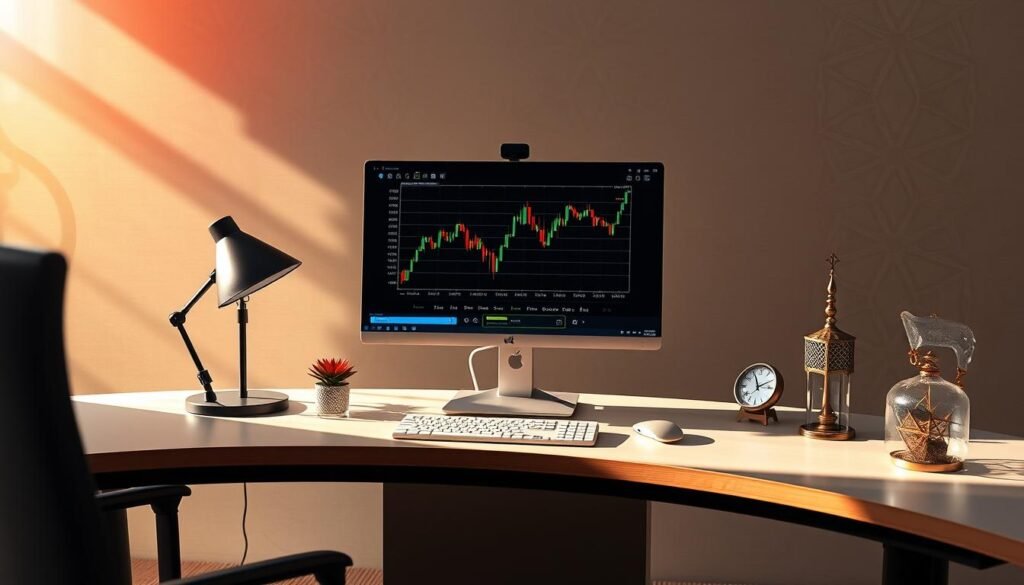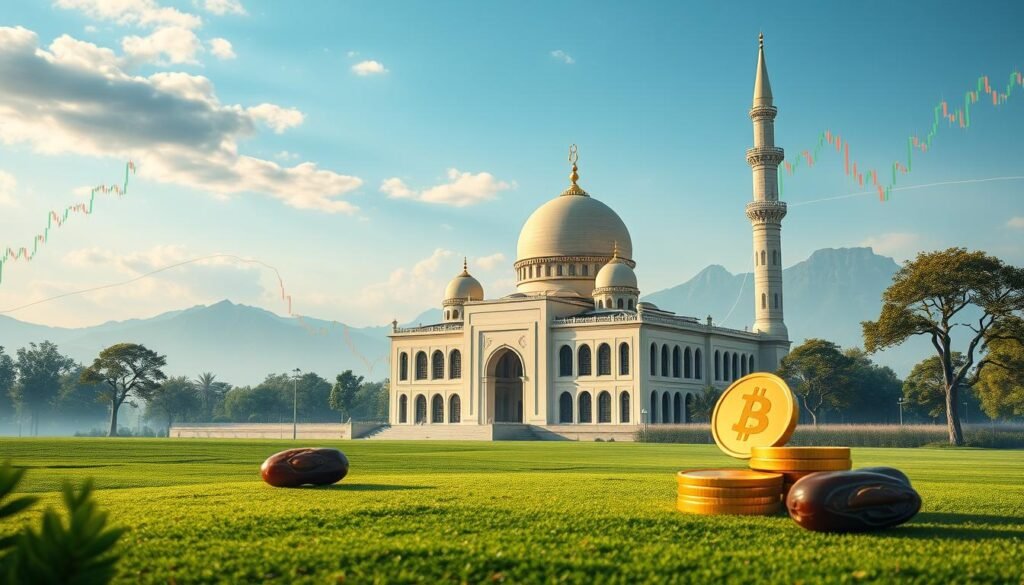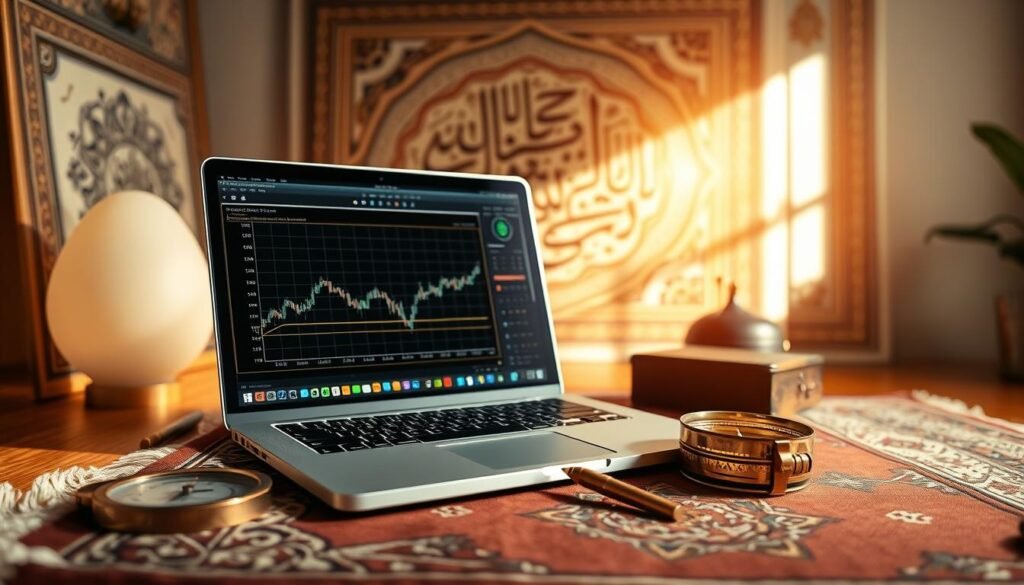Is Forex Halal? Understanding Islamic Trading
In the world of global finance, the question of whether forex trading is halal is debated. Muslims in Kenya face the challenge of understanding forex trading’s religious and ethical sides. It’s key to grasp these aspects when considering this investment.
Forex, or the foreign exchange market, is the biggest and most liquid market globally. It lets traders make money by guessing currency rate changes. But for Muslims, forex trading’s halal status is complex. It must follow Sharia, the Islamic law.
This article dives into halal forex trading. It explores Islamic finance and the rules for Sharia-compliant investing. By learning these, Kenyan readers can make smart choices about forex trading.
Key Takeaways
- Forex trading must comply with Islamic principles of Sharia to be considered halal.
- Avoiding riba (interest), excessive speculation, and other prohibited practices is crucial for Sharia-compliant forex trading.
- Sharia-compliant brokers and Islamic forex accounts offer Kenyan Muslims opportunities to participate in the forex market ethically.
- Halal forex trading strategies, such as spot trading, can be implemented to align with Islamic finance guidelines.
- Understanding the regulatory frameworks and educational resources for Islamic finance is essential for Kenyan Muslims interested in forex trading.
What is Forex Trading?
Forex trading is the biggest and most liquid financial market globally. It involves buying and selling different currencies to profit from rate changes. The market is open 24/7, 5 days a week, for both individuals and big investors.
Introduction to the Foreign Exchange Market
The foreign exchange market trades currencies worldwide. It’s the largest financial market, with over $6 trillion traded daily. It’s not in one place but works through banks and financial institutions online.
How Forex Trading Works
Forex trading involves buying and selling currency pairs based on price changes. Traders guess if one currency will go up or down against another. For example, if they think the US dollar will go up against the Euro, they buy USD/EUR. If the dollar does go up, they sell for a profit.
| Key Aspects of Forex Trading | Description |
|---|---|
| Currency Pairs | Currencies are traded in pairs, such as EUR/USD or USD/JPY, where the first currency is the base and the second is the quote. |
| Buy and Sell Orders | Traders can either buy (go long) or sell (go short) a currency pair, depending on their market outlook. |
| Global Market | The forex market operates 24 hours a day, 5 days a week, with major trading centers located around the world. |
Knowing the basics of forex trading is key for those into Islamic finance and sharia-compliant trading. By learning the forex trading rules and market, investors can make smart choices. They can also explore halal forex trading strategies.
The Concept of Halal in Islamic Finance
In Islamic finance, knowing what’s halal and haram is key. Halal means something is allowed by Sharia law. Haram means it’s not allowed. This is important for Muslims who want to invest in a way that fits their faith.
Defining Halal and Haram
Halal in Islamic finance means no interest, no uncertainty, and no speculation. These are seen as haram because they can harm people. Instead, Muslims look for options like profit-sharing and asset-backed financing.
Halal isn’t just about money. It’s about living right, including what we eat, wear, and how we interact. This view is central to Islamic finance, guiding believers to make ethical and sustainable choices.
“Halal investment is not just about avoiding the prohibited; it’s about actively seeking out opportunities that align with Islamic principles and contribute to the greater good of society.”
By grasping the differences between halal and haram, Muslim investors can confidently choose halal investments, islamic finance, and sharia-compliant trading. This ensures their money decisions align with their faith.
Is Forex Halal?
Exploring the Permissibility of Forex Trading
Many Muslims wonder if forex trading is halal. Forex is the market where currencies are traded. Some Islamic scholars worry it doesn’t follow Sharia rules.
They are concerned about speculation and taking too much risk. Islamic finance wants to avoid these things. Using leverage, which is common in forex, is also questioned because it can increase risk too much.
But, some think forex can be okay if done right. It should avoid interest and follow Sharia rules. This means no interest-bearing accounts and using Islamic accounts.
Whether is forex halal or forex halal or haram depends on how it’s done. Permissible forex accounts that follow Sharia are okay. But, anything with forbidden elements like speculation or interest is not.
Muslim traders need to check with Islamic finance experts. They should make sure their forex trading fits with their faith. This way, they can follow their beliefs in the forex market.
Sharia-Compliant Forex Brokers
For Muslim traders in Kenya, finding Sharia-compliant forex brokers is crucial. These brokers follow Islamic finance rules. They make sure their trading platforms and services meet Sharia law’s teachings.
These brokers stand out because they don’t deal in interest, known as riba. They also avoid speculative activities seen as maysir (gambling) or gharar (uncertainty). They don’t invest in industries like alcohol, gambling, or pork.
When picking an islamic forex broker, Muslim traders in Kenya should look for certain things:
- Adherence to Sharia principles and Islamic finance guidelines
- Availability of Sharia-compliant trading accounts, such as sharia-compliant trading
- Transparency in their trading practices and fee structures
- Endorsement from recognized Islamic finance authorities or scholars
- Reputable track record and positive customer reviews
Choosing a Sharia-approved forex broker lets Kenyan Muslim traders trade with confidence. They know their transactions follow their religious beliefs and ethical standards.
| Broker | Sharia-Compliant Features | Regulatory Oversight |
|---|---|---|
| ABC Islamic Brokers | Interest-free trading accounts, halal investment options, no speculative activities | Regulated by the Capital Markets Authority (CMA) of Kenya |
| XYZ Islamic Finance | Profit-and-loss sharing model, investment in Sharia-approved assets, regular Sharia audits | Approved by the Central Bank of Kenya and the Kenyan Sharia Advisory Board |
By working with reputable islamic forex brokers, Kenyan Muslim traders can trade with confidence. They know their activities match their religious beliefs and ethical standards.
Halal Forex Trading Strategies
The forex market is a great place for Islamic finance. It offers trading options that fit the needs of Muslim investors. Spot trading is a key strategy that follows Islamic law.
Spot Trading and Islamic Accounts
Spot trading means exchanging one currency for another right away at the current price. It’s seen as halal because it doesn’t involve interest or speculation. Islamic accounts are made for Muslim traders. They don’t have overnight fees or swaps that go against Sharia.
| Halal Forex Strategies | Sharia-Compliant Trading |
|---|---|
| Spot Trading | Immediate currency exchange at market price |
| Islamic Accounts | Swap-free accounts that eliminate interest-bearing instruments |
Muslim investors can trade in the forex market while following their faith. Halal forex strategies are a good way to diversify investments. They let traders join the currency market in a way that respects Islamic teachings.
Ethical Trading Practices in Forex
For Muslim traders, it’s key to follow ethical trading in the forex market. This means staying away from riba, or interest, which is forbidden in Islamic finance. Also, they should be careful with excessive speculation, as it’s like gambling and not allowed under Sharia law.
Avoiding Riba and Excessive Speculation
To trade Sharia-compliantly, Muslim traders need to focus on ethical practices. Here’s how:
- Choose Sharia-compliant brokers with interest-free accounts that follow Islamic finance rules.
- Prefer spot trading, where currencies are exchanged right away, over futures and options that feel like gambling.
- Use risk management to avoid too much leverage and speculation. This helps avoid debt, which goes against Sharia principles.
By following these steps, Muslim forex traders can trade with confidence. They know their actions align with their faith and values.
“In the quest for wealth, one must never lose sight of the ethical and spiritual foundations that guide Islamic finance. Maintaining a balance between prosperity and piety is the true path to success in the forex realm.”
The forex market is always changing, making Sharia-compliant trading more crucial. By focusing on ethics and avoiding riba and speculation, Muslim traders can succeed in the global markets while staying true to Islamic finance.
Forex Trading Rules in Islam
For Muslim traders in Kenya, knowing the rules of forex trading is key. Islamic scholars and financial groups have looked into forex trading. They’ve figured out what’s okay (halal) and what’s not (haram).
One big rule is to avoid riba, or interest. This means no trading that involves getting or paying interest. Also, trading that’s too risky or could be unfair (gharar) is frowned upon.
- Spot trading is seen as better than margin trading. It’s when you trade right away without using loans or interest.
- Islamic or swap-free accounts are popular. They don’t charge interest overnight, fitting Islamic finance rules.
- Short-selling is not good. It’s seen as risky and unfair.
- Traders must also follow ethical rules. This means no insider trading or market manipulation.
Even though there are different views on these rules, the main goal is clear. It’s to make sure forex trading follows Islamic finance and religious teachings.
| Permissible Forex Activities | Prohibited Forex Activities |
|---|---|
|
|
“The permissibility of forex trading in Islam is a topic of ongoing discussion and debate, with different interpretations and rulings from Islamic scholars.”
For Muslim traders in Kenya, it’s vital to keep up with forex trading rules. They should get advice from trusted Islamic finance experts. By following these guidelines, traders can practice Islamic finance while staying true to their faith.
Islamic Finance and Halal Investments
Muslim traders in Kenya are now focusing on Islamic finance for their investments. This approach helps them grow their wealth while following Islamic ethics and values.
Diversifying Your Portfolio Islamically
Islamic finance emphasizes diversification. It’s about spreading your investments across different halal investments and islamic finance products. This strategy includes:
- Islamic bonds (sukuk) that offer returns through profit-sharing, not interest
- Sharia-compliant trading in stocks, commodities, or currencies that avoid speculation
- Investing in ethical funds that follow Islamic principles
- Real estate investments that earn rental income, not interest-based mortgages
Diversifying your portfolio this way helps grow your wealth. It also ensures your investments match your spiritual beliefs.
| Halal Investment | Description | Key Benefit |
|---|---|---|
| Sukuk (Islamic Bonds) | Sharia-compliant fixed-income instruments that generate returns through profit-sharing rather than interest | Provides a Halal fixed-income alternative to conventional bonds |
| Islamic Mutual Funds | Investment funds that screen for Sharia-compliant stocks and avoid industries like alcohol, gambling, or pornography | Allows for diversified exposure to Halal equities |
| Rental Real Estate | Investing in properties to generate rental income, rather than interest-based mortgages | Generates Halal returns through lease agreements |
By looking into these halal investments and islamic finance options, Kenyan traders can create a diverse portfolio. This portfolio aligns with their faith and has the chance to earn good returns over time.
Navigating Forex Trading as a Muslim
For Muslim traders in Kenya, the forex market comes with its own set of challenges. Yet, with proper guidance, it’s possible to trade in a way that’s sharia-compliant. This allows you to take advantage of the forex market’s opportunities.
Finding permissible forex accounts is crucial for Muslim traders. These accounts, known as “Islamic” or “halal,” avoid interest and other forbidden practices. This ensures your trading is is forex halal.
- Identify Sharia-compliant brokers: Look for forex brokers that offer Islamic accounts. Make sure they follow Islamic finance rules and don’t engage in interest or speculation.
- Understand permitted trading strategies: Learn about trading methods that are okay under Islamic law. This includes spot trading and forward contracts, but avoid derivatives and other banned instruments.
- Manage risk responsibly: Trade with caution, focusing on keeping your capital safe rather than taking big risks. Spread out your investments and use Sharia-compliant risk management strategies.
- Stay informed on regulatory updates: Keep up with changes in Islamic finance regulations. Governments and financial bodies are always working to support Muslim traders and investors.
By understanding Islamic finance well, Muslim traders in Kenya can trade sharia-compliantly. This way, they can succeed financially while staying true to their faith.

“The key to successful halal forex trading is to prioritize ethical practices and risk management over short-term gains. It’s a marathon, not a sprint.”
| Halal Forex Strategies | Benefits | Considerations |
|---|---|---|
| Spot Trading | Immediate exchange of currencies, no interest or speculation involved | Limited leverage and potential for higher profits |
| Forward Contracts | Ability to hedge against currency fluctuations, no interest charges | Requires deeper understanding of market trends and risk management |
| Profit-and-Loss Sharing | Aligns with Islamic principles of risk-sharing and profit-sharing | Requires trust and transparency between traders and brokers |
Risks and Rewards of Halal Forex Trading
Understanding the risks and rewards of is forex halal is key for Muslim traders. Halal forex strategies let traders join global markets while following Islamic rules. Yet, there are risks to be aware of.
Potential Pitfalls
One big worry in halal forex trading is too much speculation. Islamic finance bans riba (interest) and gharar (uncertainty). Traders must avoid too much leverage and stick to ethical trading practices to follow Sharia.
Another challenge is grasping Sharia-compliant financial tools. Muslim traders need to learn about Sharia-compliant forex brokers and platforms. This ensures they make choices that fit their beliefs.
Potential Rewards
Halal forex trading has its benefits for Muslim traders. By sticking to ethical trading practices and Sharia, traders can be part of global markets. This brings a sense of spiritual fulfillment and keeps their beliefs intact.
Also, halal forex strategies can help diversify Muslim investors’ portfolios. This allows them to spread risk and earn in line with their faith.
“The key to successful halal forex trading is striking a balance between managing risks and embracing the potential rewards.”
Regulatory Frameworks for Islamic Finance
The world of islamic finance is ruled by many rules, both worldwide and in certain countries. In Kenya, the financial world has grown a strong place for sharia-compliant trading and investments.
At the global level, groups like the Islamic Financial Services Board (IFSB) and the Accounting and Auditing Organization for Islamic Financial Institutions (AAOIFI) play big roles. They help set standards and guidelines for Islamic banks. Their work ensures Sharia rules are followed everywhere, making things clear and fair.
In Kenya, the Central Bank of Kenya (CBK) and the Capital Markets Authority (CMA) are helping Islamic finance grow. The CBK has made rules for Islamic banking. The CMA has set up a way for Sukuk (Islamic bonds) to be issued.
These steps aim to make islamic finance and sharia-compliant trading fair for everyone. They want Islamic financial products and services to be seen as valuable in the financial world. Kenya’s leaders are trying to draw more investors and people to the Halal-compliant market.
The path to a full set of rules for islamic finance in Kenya is still being worked on. There’s always talk and teamwork between those in the industry, leaders, and religious leaders. As more people want Sharia-compliant financial options, the rules are likely to change. This will help create a strong and welcoming financial world.
Educating Yourself on Islamic Trading
As a Muslim trader in Kenya, knowing the basics of halal forex strategies and ethical trading is key. Learning never stops in the world of Islamic finance and Sharia-compliant investing. Luckily, many resources are out there to help you grow your knowledge and skills.
Resources for Learning Halal Forex Trading
Here are some top resources to learn about halal forex strategies and ethical trading:
- Educational materials: Check out books, online courses, and webinars on Islamic finance and Sharia-compliant forex trading. They offer a strong base in the principles and rules.
- Workshops and seminars: Go to local or online workshops and seminars by experts in halal forex trading. These events are great for learning from pros and talking with other traders.
- Online communities: Join forums, groups, and social media for Islamic finance and Sharia-compliant trading. These places are full of info, advice, and support from other Muslim traders.
- Regulatory guidelines: Learn about the rules and guidelines for Islamic finance and forex trading in your area. Knowing the legal and ethical standards helps you move through the industry smoothly.
By learning and keeping up with new info in halal forex strategies and ethical trading, you’re ready to start your journey as a Muslim trader in the foreign exchange market.

“The key to successful halal forex trading is continuous learning and a deep understanding of Islamic finance principles.”
Case Studies: Success Stories in Halal Forex
In Nairobi, Kenya, many Muslim traders are making money in the forex market the right way. They follow Islamic finance rules. Their stories show how to trade in halal forex and win financially.
Meet Fatima, a 32-year-old entrepreneur. She’s been trading in the forex market for five years. She uses ethical trading practices and follows Sharia law. This way, she makes money consistently.
“I was worried about the permissibility of certain practices in forex,” Fatima says. “But I found Sharia-compliant brokers and strategies. Now, I trade in a way that respects my faith.”
Mahmoud, a 45-year-old financial consultant, has been in the halal forex market for over a decade. He stresses the need to learn about Islamic trading rules. “It’s all about finding the right balance between risk and reward and following Islamic finance principles,” he says.
These stories prove that forex trading can be halal with the right approach. Muslim traders in Kenya are making money and staying true to their faith.
“The journey towards halal forex trading may be challenging at first, but the rewards of staying true to your faith are truly immeasurable.”
The Islamic finance industry is growing. Fatima, Mahmoud, and others inspire Muslim traders in Kenya. They show confidence and conviction in the halal forex market.
Conclusion
Understanding Sharia-compliant finance is key for Muslim traders in Kenya. The forex market offers great opportunities. But, it must be navigated ethically and in line with Islamic teachings.
We’ve looked at what’s halal and haram in Islamic finance. We’ve also seen how forex trading is allowed. It’s important to avoid riba (interest) and excessive speculation.
By learning about Islamic finance rules, Muslim traders can make smart choices. They can join the global forex market while keeping their religious values.
The path to halal forex trading is about learning and making ethical choices. We urge Muslim traders in Kenya to keep learning. They should seek advice from trusted Islamic finance sources and invest responsibly.
This way, they can succeed financially and help grow Islamic finance in their community.
FAQ
What is the Islamic perspective on forex trading?
Forex trading’s Islamic view is complex and debated. Some say it’s okay (halal) under certain rules. Others believe it’s not allowed (haram) because of interest and too much risk.
Can forex trading be considered halal (permissible) in Islam?
Islamic scholars and financial groups still discuss if forex trading is halal. Some think it’s okay if done right, avoiding interest and too much risk.
What are the key principles of Sharia-compliant (halal) forex trading?
Sharia-compliant forex trading avoids interest, gambling, and too much risk. It focuses on immediate trades and uses accounts without interest. Traders should follow Islamic finance principles.
How can Muslim traders find Sharia-compliant forex brokers?
Muslim traders can find compliant brokers by looking for Islamic accounts and Sharia principles. It’s important to check the broker’s reputation and Sharia approval.
What are some halal forex trading strategies for Muslim traders?
Muslim traders can use spot trading and Islamic accounts without interest. They can also use stop-loss and limit orders, following Islamic rules.
How can Muslim traders in Kenya diversify their portfolios with halal investments?
Muslim traders in Kenya can explore Islamic bonds, mutual funds, and real estate. These options follow Islamic finance rules, offering diversification and ethical investment.
What are the key risks and rewards of halal forex trading?
Halal forex trading risks include avoiding speculation and interest. But, it offers the chance to grow wealth and diversify ethically.









